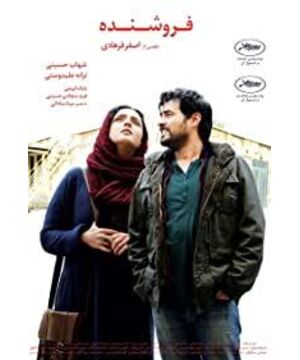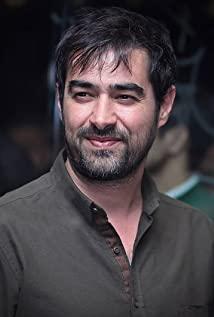Nolan's "Interstellar" repeatedly quotes a Dylan Thomas poem - "Do not go gentle into that good night". The whole poem was written during the critical illness period before the death of the poet's father, and the text is full of binary oppositions between night and day, darkness and light, mildness and violence, death and life. After reading "The Salesman", I can't help but recite this poem, and I have a new insight. In Asghar Farhadi's ingenious new work, all oppositions have been secretly shifted.
From the door that opens slowly, the whole movie begins to have a creepy magic. The huge suspense created seems to be a magnetic force that tightly grabs the viewer's attention. Staring at the door, the cold sweat was approaching, a huge sense of terror stopped abruptly at the key point, but the key plot was completely hidden. Therefore, following the words of the husband, wife and neighbors and the pictures imagined in the minds of the viewers, we reconstruct the scene of the incident and reproduce the course of the case. At this time, I couldn't help but applaud the Taiwan version of the translated title "New Home Storm". It not only inherits the context of the previous Taiwan version of "A Separation", "Separation Storm", but also summarizes the entire narrative content - the new home and the storm.
The entire film is thoughtful and detailed, with a lot of detail. As big as the structure of the play, "Death of a Salesman" goes hand in hand with the actual plot, as small as a crack in the glass of the old house and a crayon drawing on the foot of the wall of the new house, all of which make the director's control of the plot amazing. It also includes details such as being asked to change seats when carpooling, going to the balcony to put plastic sheets in the rain, tying the wrong tie and untying it again when irritable, insisting on taking away the student's mobile phone and humiliating it, etc., all of which have played a role in characterization. effect. Asghar Farhadi, one of the directors who was jokingly called "the best at talking about divorce" after "A Parting" and "The Past", also focuses on gender and marriage in this film. It's just that this time the couple is a pair of beautiful people who should be envious of others. They acted together in dramas and had like-minded interests; there may also be plans to have a child to consolidate the perfect love. After the molestation incident, the differences between the two gradually surfaced.
After the incident, although they were tacit to each other, it is undeniable that the life status and rhythm of the two were completely disrupted. What the wife fears is not the silence of the room, the bathroom and the videophone, but the noise of gossip; what the husband is washing is not the filthiness of socks, banknotes and pasta, but the cleanliness of his own heart. On the surface, the wife began to become nervous, the sound of the bread machine, the questioning when answering the door of the house again, not daring to go into the bathroom to wash, resisting the touch of her husband, and not daring to stay at home alone... but one of the neighbors. The phone call, the scandal that I wanted to hide was introduced to the troupe. People say it is scary, and the wife only then reflects on herself, whether she can withstand the attack of the rumors in the market; while the husband is like a detective in the room, picking up socks, touching and picking up banknotes, and eating food made from "dirty money". The spaghetti made him constantly wash his hands and gag, which actually reflected the onset of cleanliness in his heart. And these hidden diseases of their own may not have been realized by themselves before the event.
What's more terrifying is obviously more than that. After the husband followed the "murderer"'s pickup, the incident seemed to escalate into an accident, and the ocean currents accumulated on the ocean began to gather and brew into a monstrous storm. After discovering that the old man was the perpetrator, the husband lynched the old man despite his pleas and locked the old man in a small dark room. Although the switch was pulled down and up again, he was furious and went to the extreme of anger. At this moment, he is not a well-informed teacher, a polite neighbor, a gentle and modest husband, he is just an angry man. A man who managed to suppress his anger and licked his torn dignity with revenge.
Interestingly, the husband and wife would have a huge moral disagreement on how to deal with the old man-the wife's pity when trying to breathe, her identity is no longer the victim of abuse; the husband's indifference when returning the stolen goods, as if he He became the murderer and biggest victim of this moral storm. In my opinion, this is where the director of this film is the most brilliant. Asghar Farhadi was finally in a shabby room full of gaps, blurring the binary opposition between night and day, darkness and light, mildness and fury, death and life, and after the blurring, he was cunning and even reversed the order of each other.
The old man who was supposed to be the murderer fainted twice, and his life and death are unknown. Is the victim husband who caused all this still a victim at this moment, or has he become a new "murderer"? At the time when the wife gradually played down the identity of the victim, the husband was aggressive, showing grievances, depriving him of his sense of moral superiority, and instead became the biggest victim in this game of humanity.
The old man's face was dignified, his face was blue, and he begged bitterly, and even tried to use 35 years of marriage to beg for the last dignity. At this moment, her husband is like Satan, standing on the moral high ground, by calling the old man's relatives, sending the missing condom and a sudden heavy punch, to piece together his torn dignity. The wife's performance is even more interesting. After figuring out the situation, she first adjusted her mentality in time and begged her husband to let the old man go. Then came three warnings, one by one, saying sadly that if I told the old man's family, I would not let you go; She took hold of her husband's shirt to stop him from continuing to pester him. In the process, she had forgotten the identity of the victim, and in front of her was just an ordinary old man, an ordinary old man who would give up his seat to him on a bus, and would help rescue him when he fainted while walking. Her loud pleas further reinforce the contrast with her husband's indifference.
In the shrill sound of the ambulance whistle, the husband looked at his wife, his eyes flashed with guilt and fear of the unpredictable ending; the wife's tears had dried up, and she was speechless and had to bow her head and wrap a few wraps before turning to leave. go with. At this moment, all her warnings have been invalidated, and there is a hopeless moral cognition gap between the couple.
So I don't agree with what some people say, the story of "The Salesman" is limited to Iran. I personally think that this is a human issue with profound universal value. The same moral dilemma, similar human nature cycle, the director's film may be able to interpret a sufficient argument - those who are obsessed should not easily step into the swamp of temptation, and those who go astray should not freeze to death in the wind and snow. The door is open and you can walk in, but it is absolutely impossible to step into the bathroom of the wrong desire. However, no one is perfect. When a person who commits a crime is shivering in the cold wind, should you hold a fire for him to keep him warm, or just watch him and even push him into a glacier, causing him to freeze to death in the wind and snow?
In "Manchester by the Sea", the male protagonist Lee is stubbornly trapped in the blame of the past, unable to forgive himself and unable to live a good future life, the moment when he wants to kill himself with a gun; the priest who betrayed his faith in "Silence" is doomed Tormented by the dead and the soul, the sacrifice caused by hesitation cannot be forgiven, the moment when the body is caught in the fire; the moment when the drunken and obsessed old man in "Salesman" is exhausted physically and mentally, begging for the last trace of dignity. In these moments, no matter how unforgivable, can you and I still have a little mercy, a little mercy?
If you push it forward, the moral dwarf who is reviled by everyone in cyber violence, and the criminal dwarf who is accused by thousands of people in real life, if you are not wicked, when you see him in ragged clothes and bleak in the cold wind, can you do it for him? Add a piece of clothes and hold a spark of humanity.
View more about The Salesman reviews











